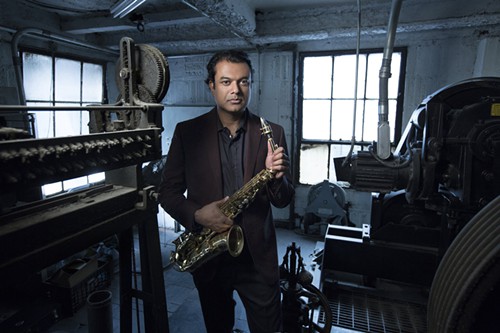
Like so many of today’s most interesting jazz musicians, the saxophonist Rudresh Mahanthappa regularly creates disparate contexts, hybrids, and concepts to develop new music. The son of Indian immigrants, he’s explored the music of the subcontinent in multiple environments: some have been explicit, such as the remarkable 2008 album Kinsmen (Pi), where he collaborated with the Indian classical-music saxophonist Kadri Gopalnath; others have been more subtle and integrated, such as the 2006 duets collection Raw Materials (Savoy) he made with pianist and fellow Indian-American Vijay Iyer. On other records he’s developed his compositions around cryptology and number theory (Codebook [Pi]), while yet another celebrated one of his mentors and musical heroes—the saxophonist Bunky Green.
His latest album is an homage to another key influence—Charlie Parker—but it’s also a rigorous compositional exercise wherein Mahanthappa isolates specific DNA from some of Bird’s most important compositions and solos to create new tunes that are, in most cases, utterly unrecognizable. Bird Calls (Act) is clever and consistently entertaining—it’s fun to tease out his conceptual acrobatics. His piece “Maybe Later” retains the rhythmic patterns of Parker’s definitive solo on “Now’s the Time” but totally changes the notes, while “Both Hands” rejiggers the melody line of Bird’s “Dexterity” by removing all of its rests, which transforms the tune into a breakneck tangle. Jazz has a long tradition of musicians writing new tunes based on the chord changes of standards, and Mahanthappa indulges in this practice only once: the lovely ballad “Sure Why Not?,” which is derived from both “Confirmation” and “Barbados,” songs that moved at much swifter tempos. The most explicit Parker quote comes on “Talin is Thinking,” which nabs a seven-note phrase from the melody of “Parker’s Mood.”
In his liner notes Mahanthappa explains his desire to pay tribute to Parker with predictable readings of his repertoire. “Imitating Parker is of no consequence to forwarding this form, but developing new perspectives upon tradition is the substance of contemporary expression,” he writes. Instead, the Mahanthappa demonstrates the lessons of the bebop patriarch through a transformation of ideas into something modern.
Ultimately, however, Mahanthappa’s exercises probably benefit him and his excellent bandmates more than the average listener, because Bird Calls stands easily on its own, without any knowledge of its conceptual underpinnings. He’s joined by his longtime bassist François Moutin, the pianist Matt Mitchell (a valuable collaborator of Tim Berne’s and Dave Douglas’s), drummer Rudy Royston (Bill Frisell, Dave Douglas), and the dazzling 20-year-old trumpeter Adam O’Farrill (son of pianist Arturo O’Farrill), and they engage fully with the compositions by matching the leader’s fire at every turn. Both on a series of five short pieces (“Bird Calls”) and the brainy reinventions, the band seizes on the opportunities offered by Mahanthappa’s flinty, jagged, multivalent writing. “Bird Calls #5,” for example, is a beautifully lyric, wandering solo from Mitchell, while “Bird Calls #3” is a fiercely slaloming alto solo by the leader.
Below you can hear the track “Chillin'”—a piece based on “Relaxin’ at Camarillo”—where fragments of the original are woven into the new piece (with a request from the composer to intersperse ideas from the Parker tune into individual improvisations as well).
http://www.chicagoreader.com/Bleader/archives/2015/02/13/saxophonist-rudresh-mahanthappa-pays-homage-to-charlie-parker-his-way
source:http://www.chicagoreader.com / The Chicago Reader – The Bleeder / Home> – Music – Post No Bills / by Peter Margasak / February 13th, 2015

